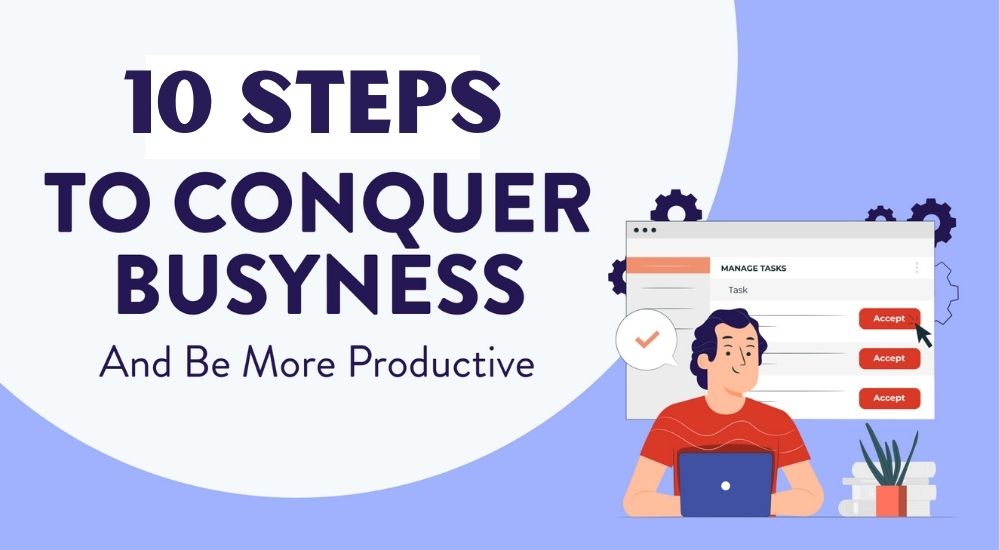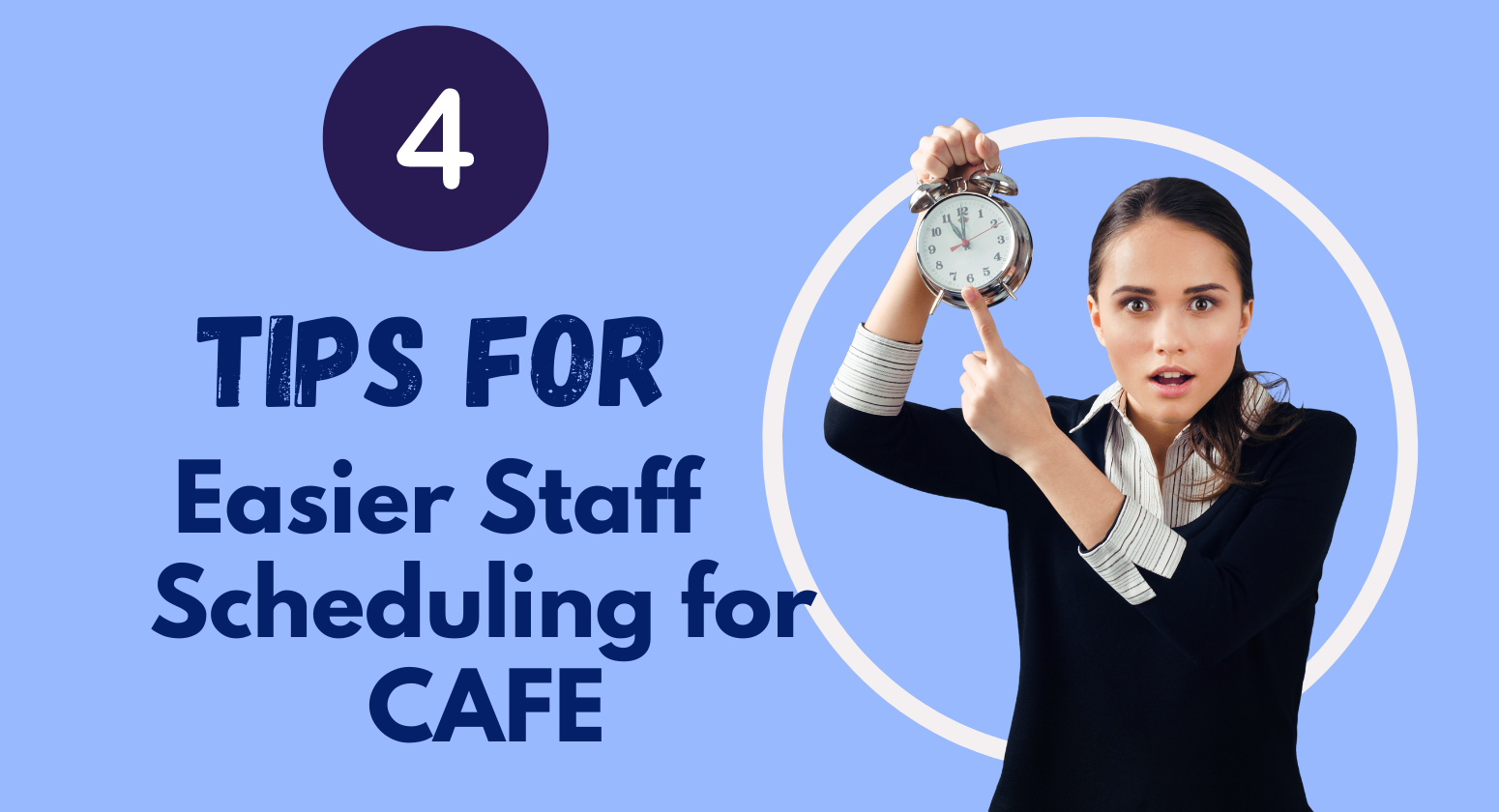
Each of us has our definition of success. For some, it is a new car, a business making a profit, or a management position. Defining success is personal, and external opinions can easily influence it.
Harvard Business Review studies found that ‘busy culture’ or the concept of busyness dramatically impacts productivity and personal growth. Further, by constantly prioritizing work, boundaries with employees’ personal lives erode and impact well-being and relationships.

Source: Harvard Business Review
Conquering the busy culture and improving efficiency in the workplace is an important and urgent task. You must make multiple considerations to ensure that you don’t let busyness at work take over your life.

Continue reading our guide for ten tips for conquering busyness and boosting your productivity level.
Our Tips to Help You Avoid a “Busy Culture” at Work
Successful people aim for maximum productivity and effectiveness, prioritizing tasks based on their importance and expected impact.
To address the busy culture in your life, try these ten steps.

1. Redefine Productivity in the Workplace
Busy culture drives an obsession with the appearance of being busy. It encourages individuals to generate tasks as a marker of success and hard work.
Therefore, conquering busyness requires resetting your mindset.

By changing the way you think, you can change your perception of success.
For example, you may think that the busier you are, the more successful you will be. However, if you give yourself less to do, you can finish your current tasks to a higher standard.
Redefining what productivity means to you allows you to refocus your daily schedule.
2. Consider Your Values
Your values should guide your decision-making about your career, home life, and personal view of success.
In a survey by PWC, 16% of Australian workers stated that their preference for a company moving forward is experience. This means they want culture, diversity, and support systems, so they consider their values before starting a job.
Busy culture relies on the cultural impact of following the lead of others, which you can disrupt by choosing your path. Determining your version of success can redirect your time and energy, leading to increased creativity and happiness.
3. Make Time for Nature and Exercise 🍃
Taking time outside for exercise or a cup of coffee can help improve relaxation and creativity and reduce stress.

Remember to take breaks from your computer for your physical and mental well-being. Include outdoor time on your daily schedule, or invest in a pet that gives you a compelling reason to go outdoors more often.
These breaks are instrumental to staying true to your values and personal goals.
4. Say No to New Tasks if You Have Too Many to Complete ⛔
When you start a new job, it is easy to volunteer to take on extra work to make a good impression on your colleagues and employers. If you begin to do this in a new job, you are more likely to get into a habit of doing it regularly.
If you take on too much work regularly, you may work overtime as a standard part of your schedule. Employees working too many hours is a more significant problem in Australia than in America.
According to a detailed OECD Better Life Index survey, 13% of Australian employees work incredibly long hours. This percentage is larger than the OECD average, so overworking is a significant problem in Australia.

Source: OECD Better Life Index
Also, If you often take on tasks you shouldn’t because of your heavy workload, your colleagues may take advantage of this by asking you to do their tasks.
Therefore, you should learn to say no once in a while. If your employer asks you to take on extra work that will force you to do overtime and ruin your work-life balance, explain that your current workload is too large.
They should understand this because prioritizing work-life balance is crucial in the modern working world.
5. Create a Personalized Work Schedule
Good time management strategies are imperative to defeating a busy culture.
Balancing your time with family, work, exercise, and fun is critical for happiness. You should schedule activities with your family in advance so you can effectively implement them into your schedule.

Further, allocating time for important tasks leads to improved effectiveness. Track your time for a few days to see where you are spending too much or too little time. Doing this may help you to use your time more effectively.
6. Make Time for Fun Activities 🎳
Don’t forget about the activities you enjoy or are passionate about. Perhaps it is sport, baking, or music.
When you spend time enjoying yourself, you can relax more, reduce stress, and become more able to manage time effectively.
Remember that you must make room in your schedule for fun to ensure you have time. If you say that you’ll do it but don’t add it to the schedule, there may still be a chance that you forget or don’t have time for it.
Here are some examples of fun out-of-work activities you can add to your weekly schedule.

7. Prioritize Rest and Time Away 😴
According to The Wellness at Work Report by Employmenthero, 52% of Australian workers give their work-life balance a rating of poor or average. Relaxation can be a key to lowering this percentage.
Busy culture relies on the idea that we can work endlessly. However, wellness and relaxation are crucial for your well-being.
Take time with your family or friends, plan a vacation or break. A break from digital devices and social media may help to reduce stress and help your body recover from particularly challenging periods.
Also, take some time to relax alone. For example, you can take an hour to lie down and listen to music or read a book.
8. Incorporate Mindfulness into Your Schedule 🧘
One way many people love to relax is to engage in mindfulness and meditation.
Meditating is a brilliant way to relax the muscles and the mind. You can empty your mind of all stress and free your thoughts. Meditation may help if you lack clarity on a specific part of your life.
Additionally, if specific tasks throughout the day split your focus, meditating can be a reset button.
If you want to commit to meditating to help you relax, make it a crucial part of your schedule. You may need more than saying you will meditate because you may forget or run out of time.

Meditating at home is the best option because it is a peaceful space away from work. However, meditating in the workplace can also help, especially when your workload is heavy.
You could suggest that your employer hold meditation sessions daily or weekly so you and your employees can do it mid-shift.
9. Adapt the Way You Tackle New Challenges
If you find a new task too challenging, try tackling it differently.
Because busy culture is stressful, it often forces us to work uniformly for every task. However, deciding to tackle a challenge in a new and creative way may help you complete the task with increased efficiency. Also, it will be a more refreshing experience, so it will prevent busyness from overwhelming you.
You can also adapt the place you work in the week. Flexible working is now more popular in Australia.
According to an August 2021 study by the Australian Bureau of Statistics, 36% of Australian workers stated they have a flexible working arrangement with their employer. In 2015, this number was only 32%.

Source: The Australian Bureau of Statistics
You may want a flexible working arrangement in Australia if you want more time with your family or if getting into work takes a long time. If you adapt and have a hybrid agreement, you will avoid the “busy culture” while still completing your work.
10. Build a Supportive Network At Work and Home
If busy culture is something you struggle with, you shouldn’t do it alone.
Therefore, you should have a supportive personal network at home who can help you achieve a work-life balance. This will usually be your family because they will be with you all week and regularly offer support.
You can also lean on your friends if you know they will offer support.

As well as a support system at home, you should have one at work. The easiest way to do this is to have colleagues in your system. You can also offer to be in their support system.
You should also consider networking to find support outside the office, like a mentor.
Final Thoughts on Boosting Efficiency by Conquering Busyness
A busy culture impacts productivity by prioritizing work for the sake of appearing to be busy and successful. Redefining success by your values links to better well-being and improved satisfaction with life.






